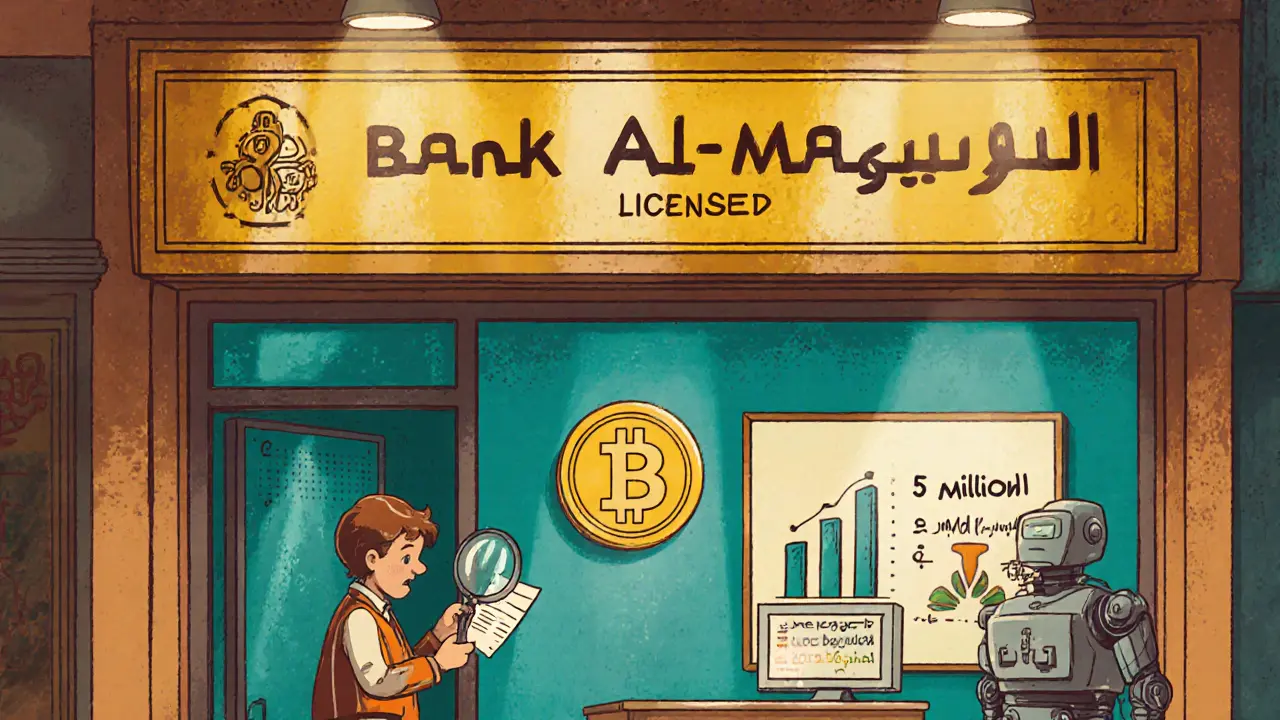Morocco Crypto Compliance Checker
Select your activity type and check if it complies with Morocco's 2025 crypto regulations:
- 1Crypto trading only legal on licensed platforms
- 2Mining completely prohibited
- 315% capital gains tax applies
- 4Commercial crypto payments forbidden
- 5Minimum license capital: MAD 5 million
Enter your activity details and click "Check Compliance" to see if it meets Moroccan regulations.
| Individual | MAD 20,000-100,000 |
| Corporate | Up to MAD 500,000 |
| Mining | MAD 100,000-300,000 |
Capital Gains Tax:
15% on profits from crypto sales
Reporting Required:
Annual Declaration Form (Capital Gains from Digital Assets)
Foreign exchange violations for cryptocurrency in Morocco refer to the legal breaches that occur when digital asset transactions bypass Morocco's foreign exchange control laws, which are overseen by the central bank and related authorities. The shift from a total ban in 2017 to a partially regulated market in 2025 has left many traders, startups, and investors wondering what they can-and cannot-do without triggering hefty fines or criminal charges.
TL;DR
- Cryptocurrency trading is only legal on platforms licensed by Bank Al-Maghrib.
- Unlicensed activity can cost individuals up to MAD100,000 and businesses up to MAD500,000.
- Mining remains completely prohibited; penalties are similar to unlicensed trading.
- Profits are taxed at 15% capital‑gains rate and must be reported to tax authorities.
- Cross‑border commercial payments must still use traditional banking channels.
From Total Prohibition to Controlled Liberalisation
In November 2017, Morocco issued a blanket ban on all cryptocurrency activity. The ban was justified by the Ministry of Economy and Finance, which argued that crypto trading violated existing foreign exchange regulations that have been in place since independence. The enforcement arm was the Foreign Exchange Office, working hand‑in‑hand with Bank Al-Maghrib, Morocco's central bank.
During the 2017‑2024 period, most Moroccan crypto users moved to peer‑to‑peer (P2P) groups, over‑the‑counter (OTC) desks, and offshore exchanges to avoid detection. The underground nature of that activity made enforcement difficult, but occasional raids resulted in fines ranging from MAD20,000 to MAD100,000 for individuals.
2024‑2025: The Draft Law and Its Core Pillars
At the African Central Bank conference in Rabat (March2024), Governor Abdellatif Jouahri announced a draft law that would legalise and regulate crypto use. By late 2025 the law was finalised, and it introduced three critical pillars:
- Consumer protection - mandatory KYC, AML/CFT procedures, and dispute‑resolution mechanisms.
- Market integrity - licensing of exchanges, reporting of suspicious transactions, and supervision by Bank Al-Maghrib.
- Foreign‑exchange control - crypto can be used for personal investment but not for commercial payments or international settlements.
The law also earmarked a 15% capital‑gains tax on crypto profits and gave the Moroccan Capital Market Authority (AMMC) oversight of ICOs and tokenised securities.
Licensing Framework: Who Can Operate?
Only platforms that obtain a licence from Bank Al-Maghrib may offer crypto‑related services. The licensing process requires:
- Proof of sufficient capital (minimum MAD5million).
- Robust AML/CFT compliance programmes, including real‑time transaction monitoring.
- Technical audits of the trading engine and custody solutions.
- Regular reporting to the Foreign Exchange Office on foreign‑currency inflows and outflows.
As of October2025, four platforms have successfully obtained licences and are publicly listed on the central bank’s website.
Enforcement and Penalties
Violations are taken seriously. The penalty matrix looks like this:
| Violator Type | Offence | Fine Range (MAD) | Possible Additional Action |
|---|---|---|---|
| Individual | Unlicensed trading or OTC activity | 20,000 - 100,000 | Criminal proceeding for repeat offences |
| Corporate entity | Operating without a licence or facilitating cross‑border payments via crypto | Up to 500,000 | Business suspension, asset seizure |
| Mining operation | Any mining activity (hardware or cloud‑based) | 100,000 - 300,000 | Criminal charges under energy‑use statutes |
The fines are calibrated to the violator’s financial capacity, but courts can double the amount for intentional evasion.

Mining Remains Banned
Even after the 2025 reforms, mining is still illegal. The government argues that mining creates hidden foreign‑exchange outflows: equipment is often imported, electricity is purchased from neighbouring grids, and miners can sell hash power abroad for foreign currency. The same penalty matrix applies, and the Energy Ministry works with the central bank to monitor suspicious electricity spikes.
Taxation and Reporting Obligations
All crypto gains are subject to a 15% capital‑gains tax. The tax is calculated on the difference between the acquisition cost (converted to Moroccan dirhams at the official exchange rate) and the disposal value. Reporting must be done through the annual “Declaration of Capital Gains from Digital Assets” form, filed with the Tax Authority (Direction Générale des Impôts). Failure to report can trigger an additional 10% surcharge on the unpaid tax.
Licensed exchanges are required to issue an annual statement to each user, showing total purchases, sales, and fees paid. This statement can be uploaded directly to the tax portal, streamlining compliance.
Practical Tips for Staying Within the Law
- Use only licensed platforms. Verify the licence number on Bank Al‑Maghrib’s public register.
- Keep detailed records. Save transaction hashes, conversion rates, and invoice receipts for every trade.
- Implement strong KYC. If you run a small exchange or a crypto‑fund, adopt the same verification standards as banks.
- Separate personal and business wallets. Mixing funds can be interpreted as trying to evade foreign‑exchange monitoring.
- Stay away from mining. Even hobbyist mining rigs can be classified as illegal activity.
Regional Context: How Morocco Stacks Up
Neighbouring countries have taken different routes. Canada fully legalises crypto mining and offers tax incentives, while Kazakhstan attracts miners with cheap electricity. Those contrasting policies have pushed Moroccan investors to set up operations abroad, often in Europe or the Gulf.
The International Monetary Fund (IMF) and the World Bank have praised Morocco’s cautious approach, noting that a well‑designed licensing regime can protect monetary sovereignty while still fostering fintech innovation.
The e‑Dirham Connection
Parallel to the crypto reforms, Bank Al‑Maghrib is piloting the e‑Dirham, a sovereign digital currency aimed at reducing cash dependence and improving cross‑border payment tracking. The e‑Dirham pilot includes a phase with the Central Bank of Egypt and the World Bank, focusing on foreign‑exchange transparency-exactly the issue that sparked the 2017 crypto ban.
While the e‑Dirham is government‑issued and fully regulated, private cryptocurrencies remain a complementary asset class for speculation and diversification, provided users respect the licensing and tax rules.
Future Outlook
Analysts predict the Moroccan crypto market will hit roughly $280million in 2025 and grow beyond $300million by 2027. The key drivers will be:
- Expansion of licensed exchanges, especially those offering stable‑coin pairs linked to the dirham.
- Integration of crypto wallets with the e‑Dirham ecosystem, creating hybrid payment solutions.
- Regional harmonisation efforts led by the African Union, which may eventually align foreign‑exchange rules across North Africa.
If the licensing framework proves effective, Morocco could become a model for other emerging economies that want to balance innovation with monetary stability.

Frequently Asked Questions
Is it legal to buy Bitcoin in Morocco in 2025?
Yes, but only through a platform that holds a licence from Bank Al‑Maghrib. Buying on unlicensed P2P sites can trigger fines up to MAD100,000.
Can a Moroccan business accept crypto for international invoices?
No. The 2025 law expressly prohibits using crypto for commercial payments or cross‑border settlements. Companies must use traditional banking channels to stay compliant.
What are the tax implications of crypto trading?
All realized gains are taxed at a flat 15% capital‑gains rate. The taxable amount is calculated in Moroccan dirhams using the official exchange rate on the day of disposal, and the gain must be reported in the annual tax return.
Is crypto mining allowed in Morocco?
Mining is completely illegal. Any mining activity-whether on‑site hardware or cloud‑based services-can lead to fines of up to MAD300,000 and possible criminal charges.
How do I verify if an exchange is licensed?
Visit the official Bank Al‑Maghrib website and check the public register of crypto‑exchange licences. The licence number must be displayed on the exchange’s homepage.


Chris Hayes
October 31, 2024 AT 02:50Morocco finally stopped treating crypto like a black market, but the licensing fees are astronomical for startups.
Samuel Wilson
November 11, 2024 AT 16:37The transition from a blanket ban to a regulated framework demonstrates a prudent approach to balancing innovation with monetary stability.
Christina Norberto
November 23, 2024 AT 06:23The promulgation of the 2025 cryptocurrency statute in Morocco represents a paradigmatic shift from prohibition to conditional legitimization. From a jurisprudential perspective, the law delineates a triadic structure: consumer protection, market integrity, and foreign‑exchange control. Such a schema, while ostensibly comprehensive, tacitly embeds a surveillance apparatus that can be weaponized against dissenting financial actors. The mandatory KYC and AML mandates impose a level of opacity that paradoxically contravenes the decentralised ethos of digital assets. Moreover, the stipulated minimum capital of five million dirhams erects an insurmountable barrier for nascent enterprises, effectively consolidating power among a handful of incumbents. The penalty matrix, calibrated by the violator’s fiscal capacity, reveals an underlying deterrent calculus designed to stifle illicit activity through economic intimidation. It is noteworthy that the fines for mining operations mirror those for unlicensed trading, despite the distinct nature of the energy consumption externalities involved. The tax provision of a flat fifteen percent on capital gains, albeit transparent, may dissuade speculative participation, thereby curtailing market liquidity. Simultaneously, the prohibition of crypto for commercial payments underscores the state's resolve to preserve the primacy of the dirham in international settlements. The juxtaposition of the e‑Dirham pilot with the restrictive crypto regime suggests a bifurcated monetary policy: state‑issued digital currency versus privately issued tokens. Critics argue that this duality engenders regulatory ambiguity, leaving market participants in a state of perpetual compliance uncertainty. Nevertheless, the involvement of international bodies such as the IMF lends credence to the notion that a measured regulatory cadence can coexist with fintech innovation. The enforcement actions recorded between 2017 and 2024, though sporadic, indicate a capacity for punitive measures that may be amplified under the new law. In practice, licensed exchanges are now obligated to furnish annual transaction statements, a requirement that facilitates tax reporting but also expands governmental data harvest. Consequently, stakeholders must navigate a labyrinthine compliance landscape, balancing entrepreneurial ambition against the specter of substantial fiscal penalties.
Aditya Raj Gontia
December 4, 2024 AT 20:10The compliance framework is basically a bureaucratic maze.
mannu kumar rajpoot
December 16, 2024 AT 09:57While the law purports to protect, it also creates a surveillance state that monitors every transaction.
Tilly Fluf
December 27, 2024 AT 23:43Your concerns are valid; maintaining a strict licensing regime can indeed safeguard the financial system while still encouraging responsible innovation.
Darren R.
January 8, 2025 AT 13:30Behold! The moral abyss into which a society descends when it chooses to criminalize technological progress!!
Hardik Kanzariya
January 20, 2025 AT 03:17I understand the frustration; let's focus on practical steps like using the official licence register and keeping meticulous records.
Shanthan Jogavajjala
January 31, 2025 AT 17:03If we ignore the moral panic, the real issue remains the opaque criteria for granting those five‑million‑dirham licences.
Jack Fans
February 12, 2025 AT 06:50Here’s a quick checklist: verify the licence number on Bank Al‑Maghrib’s site; download your transaction CSV; upload it to the tax portal before the deadline.
Linda Welch
February 23, 2025 AT 20:37Oh great, another brilliant move by the Moroccan authorities: tell us we can trade Bitcoin, but only if we hand over our soul in the form of endless paperwork. It’s not like they already have enough red tape for businesses to navigate; now they add crypto on top of it. The 15% capital‑gains tax sounds reasonable until you realize you have to convert every trade to dirhams at the official rate, which is often out of sync with market realities. And let’s not forget the fine structure – a single slip could cost you a hundred thousand dirhams, which, for most of us, is more than a modest apartment. The prohibition on mining is another masterpiece; they claim it drains energy, yet they ignore the fact that legitimate mining operations could fund renewable projects. If you’re a small investor, the only viable path is to join one of the four licensed exchanges and pray they don’t change the rules overnight. The e‑Dirham pilot is a shiny distraction, a state‑run digital token meant to keep the cash‑less dream under government control. All of this boils down to one simple truth: the state wants to watch every pixel of your financial life, and it will succeed if we don’t collectively push back.
meredith farmer
March 7, 2025 AT 10:23The crypto crackdown is merely a smokescreen for a hidden agenda orchestrated by shadowy financiers seeking to monopolise the digital economy.
Peter Johansson
March 19, 2025 AT 00:10I see where you’re coming from 😊; however, engaging with the official framework can still protect you from unintended legal fallout.
Cindy Hernandez
March 30, 2025 AT 14:57For anyone uncertain, consulting a local tax advisor familiar with the 2025 crypto regulations ensures compliance without sacrificing investment goals.